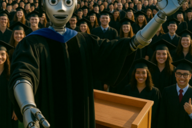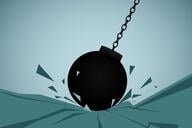You have /5 articles left.
Sign up for a free account or log in.

Sladic/Getty Images
There is nothing -- and I mean nothing -- more mind-numbing on this earth than educational data. Don’t believe me? Answer this question:
Your country is humming along, business as usual, when a worldwide pandemic knocks at your door. Thinking it might be a good idea to make sure your children are safe, you close the schools for a while but keep teaching the students. Some students are now learning online, and some are learning through remote lessons they pick up and drop off, but one thing is certain -- they have never, ever learned like this before.
Here’s the question. Do they learn as much from this new way as they do from the way they’ve known for their entire life?
Take your time.
Right. This is kind of like asking, would you score as many points if you bowled with your other hand? And yet, now that data is out with average grades and test scores (yes, they are lower), the wailing and gnashing of teeth in certain corners of the world would lead you to believe this issue is the pandemic, not one of its by-products. Just what, the critics shriek, were we thinking?
Happily, since we’re talking education here, there are two answers. First and foremost, we were thinking we didn’t want to kill our students. Even if the testing and the grades are right, and America’s future doesn’t have as tight a grip on the Pythagorean theorem as we’d like, we still get to see their smiling faces at dinner and tuck them in their beds at night. So there’s that.
The second answer is a little less obvious -- we weren’t thinking. In what couldn’t be a better example of how not to do something, our educational complex was so busy converting everything to remote instruction, no one stopped and asked, are the students going to know how to use this stuff?
If you don’t think that’s important, think about what would happen if all bakeries in the United States had to start using the metric system. In a day.
Are you going to buy bread there for a while, or wait until they worked things out?
Never mind that most teachers have never taught remotely (that’s a huge factor) and we were asking them to start doing it and be great at it in a week. At what point did we sit the students down and say, “Part of this will seem the same, but most of it is different. Here’s how to handle that.” When did we say the same thing to parents? Nannies? Elderly neighbors who watch the kids while the parents cling to their jobs?
But wait -- it gets better. Not only did we not think of this last spring; it also didn’t occur to us over the entire summer. Knowing most schools were going to still use some kind of remote learning this fall, did we convene blue-ribbon panels on best practices for remote teaching and offer online seminars to all teachers for free? Did we secure the support of movie stars who have lots of time on their hands and produce social media products on TikTok and YouTube, showing students the importance of how to learn, not just what to learn? Did we produce 30-minute seminars that offered gift card giveaways for students to try these skills out before they actually needed them?
And we’re worried the kids don’t know the Pythagorean theorem.
The tough part? Experts already exist in these fields. We’re a couple of phone calls away from organizing a dozen online conferences that can produce meaningful change in remote learning and teaching in a matter of hours. Handel wrote the Messiah in three weeks. The late, great funkmaster Rick James allegedly wrote a million-selling album overnight. We’re about 20 hours away from turning the educational tide for the better, and what’s really on our minds? Who the next secretary of education will be.
No offense, but if you’re looking for educational leadership, start by looking in the mirror and picking up the phone.
Or not.




